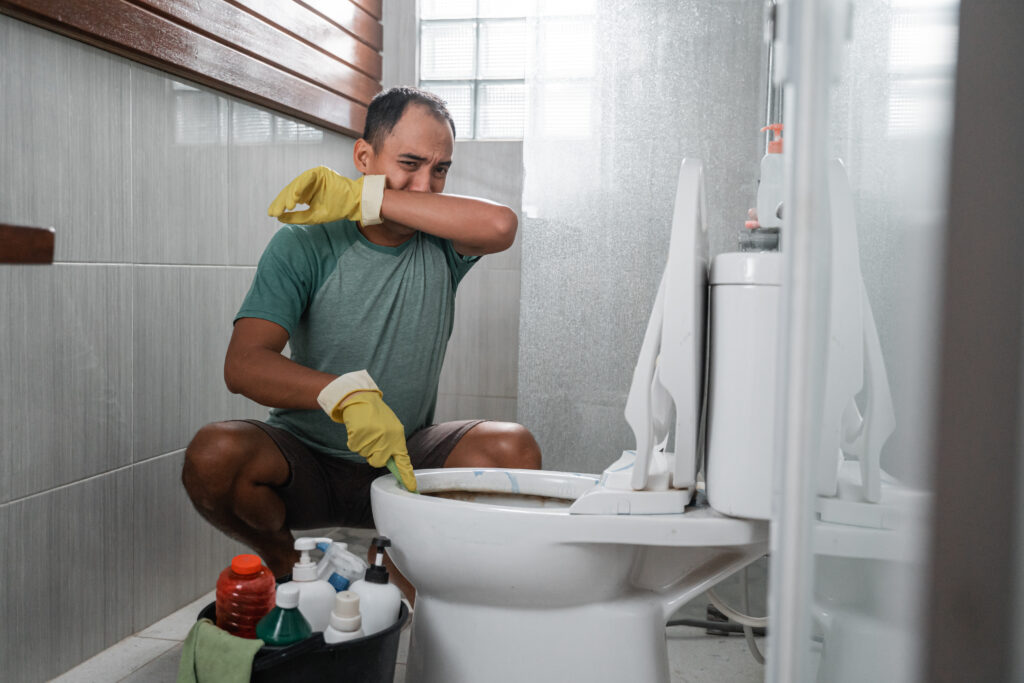There’s nothing quite like walking into your home after a long day only to be greeted by the unmistakable odor of rotten eggs. That foul sewer gas smell isn’t just a buzzkill for your cozy evening. It’s a red flag. Left unchecked, sewer gas leaks can lead to serious property damage.
If your bathroom, basement, or kitchen smells suspiciously like sewage, it’s time to play detective. We’re breaking down everything you need to know, from identifying sewer gas problems to kicking the smell to the curb for good. Let’s get to the bottom of why your house smells like sewage and what you can do about it.
Understanding Sewer Gas and Its Dangers
Sewer gas is a noxious mixture of toxic and non-toxic gases produced by the decomposition of organic matter in your home’s plumbing system. This includes methane, hydrogen sulfide, ammonia, and carbon dioxide.
Not only does sewer gas stink, but it can also affect your respiratory system and overall health. Prolonged exposure can cause nausea, dizziness, fatigue, vomiting, and even headaches. In high concentrations, it can become a serious hazard that warrants an immediate call for emergency plumbing service.
Common Signs of Sewer Gas Leaks in Your Home
If your house stinks like sewer, you’re not imagining things. Here are some unmistakable signs that you’re dealing with sewer gas smells:
- Rotten Egg Smell: The classic indicator. That sulfur-like stench? It’s likely hydrogen sulfide, a byproduct of sewage and bacterial growth. If the smell keeps coming back after cleaning, it’s something deeper.
- Slow Drains: Sluggish drain performance in your sink, bathtub, or shower could signal a partial blockage or dry trap. This can allow sewer gas to escape back into your living space.
- Gurgling Toilets: Your toilet shouldn’t sound like it’s trying to talk back. Gurgling noises can mean pressure issues or trapped gas trying to escape.
- Dry or Cracked Traps: The U-shaped pipes under your sinks and drains are supposed to hold water that blocks gas from entering your home. If these dry out due to evaporation, the smell has a free pass.
- Increased Allergy Symptoms: If you’re suddenly dealing with watery eyes, congestion, or other irritation, it might be sewer gas.
- Odor Near Specific Fixtures: Bathroom drain smells like sewage? Laundry room giving off weird vibes? Odors that are strongest near certain plumbing fixtures are telling you where the issue lives.
What Causes Sewer Gas Leaks?
Sewer gas leaks can originate from a number of plumbing or structural problems.
First, damaged or improperly installed traps are a major culprit. Whether it’s a dry trap from lack of use or a poor seal in your floor drain, these allow sewer gas to sneak past the barrier meant to block it. This is common in guest bathrooms, unused laundry rooms, or seasonal spaces.
Second, cracked or disconnected pipes, broken gaskets, and faulty flanges can all open up avenues for gas leaks. Over time, corrosion, pressure changes, and tree root infiltration can damage your plumbing infrastructure, leading to an invisible but smelly leak.
How to Identify the Source of the Smell
Before grabbing a drain cleaner or pouring vinegar down the sink, it’s worth trying to pinpoint the source of the smell.
Do a sniff test — yes, we know it’s gross. Follow the odor to its strongest point. Is it your toilet? The kitchen sink? The basement floor? Once identified, shine a flashlight into drains, look for standing water, and check for visible debris or mold.
Solutions to Eliminate Sewer Gas Odors
Got that nasty sewer gas odor? Here’s how to fix it:
- Re-Water the Traps: Pour a quart of water into any unused drains, especially in the laundry, basement, or guest bathroom.
- Inspect and Replace Gaskets and Seals: Cracked or worn gaskets around toilets and flanges should be replaced. Check caulk and wax seals for integrity.
- Use Natural Cleaners: A combo of boiling water, vinegar, and baking soda can break up small clogs and dislodge organic matter. Bonus: it’s environmentally friendly and safe for most pipes.
- Snake the Drain: A handheld snake can remove biofilm, debris, or grease buildup causing backup or odor.
- Ventilation Boost: Poor ventilation can trap sewer gas in your home. Install or service roof vents, air conditioning units, or bathroom exhaust fans to improve indoor air quality.
- Professional Inspection: If nothing’s working, a plumbing inspection with a camera can locate hidden damage in your sewer or septic tank.
When to Call a Professional Plumber
If your house smells like sewage and none of your go-to tricks are working, it’s time to bring in the big guns.
Our Salt Lake City plumbers come equipped with specialized equipment to detect sewer gas leaks, check pipe integrity, and test pressure in your sanitary sewer system. They can perform detailed camera inspections to detect leaks and recommend long-term solutions that safeguard your health and property.
Especially if you’re noticing signs like frequent headaches, shortness of breath, or visible mold and water damage, don’t hesitate. Gas leaks are not worth gambling with.
Big Brothers Helps You Maintain a Fresh and Safe Home Environment
At Big Brothers Home Services, we don’t just tackle problems — we stop them from coming back. If your house smells like sewer, it’s time for more than a bottle of bleach or a store-bought drain cleaner. You need a reliable partner with the tools, training, and tenacity to fix it right.
Our licensed professionals are skilled in detecting a sewer backup. Call Big Brothers Home Services today for a full sewer inspection, expert diagnostics, and friendly service that’s always excited to help.

